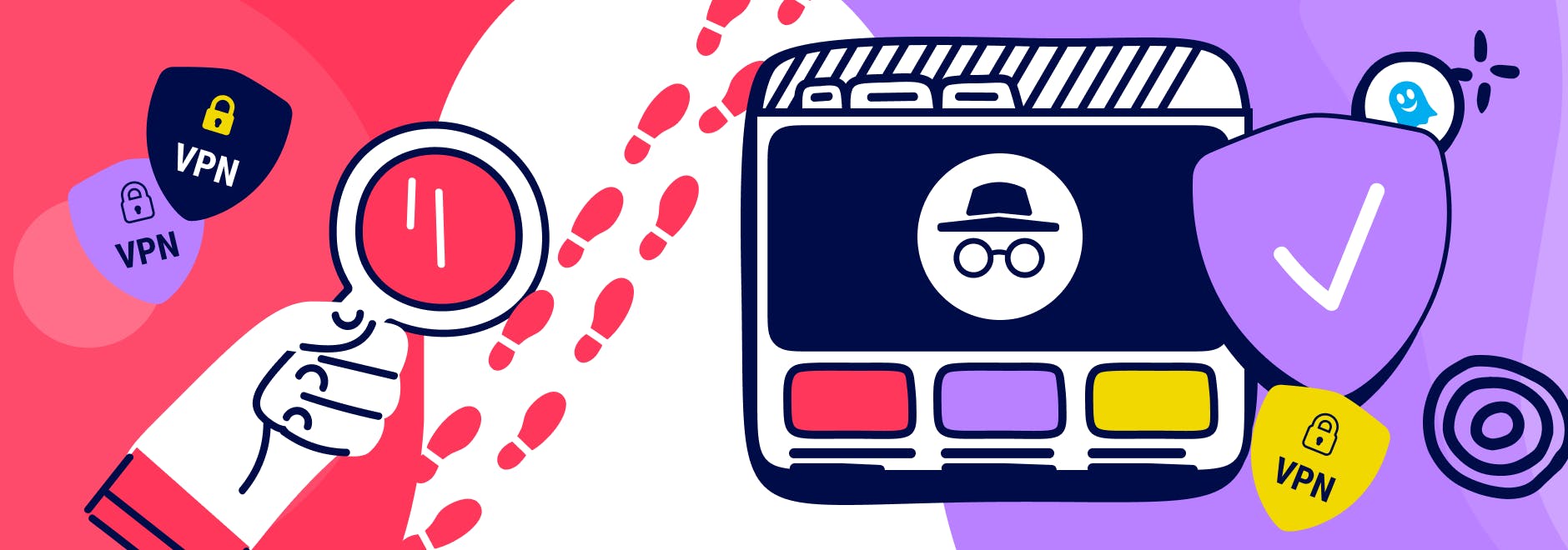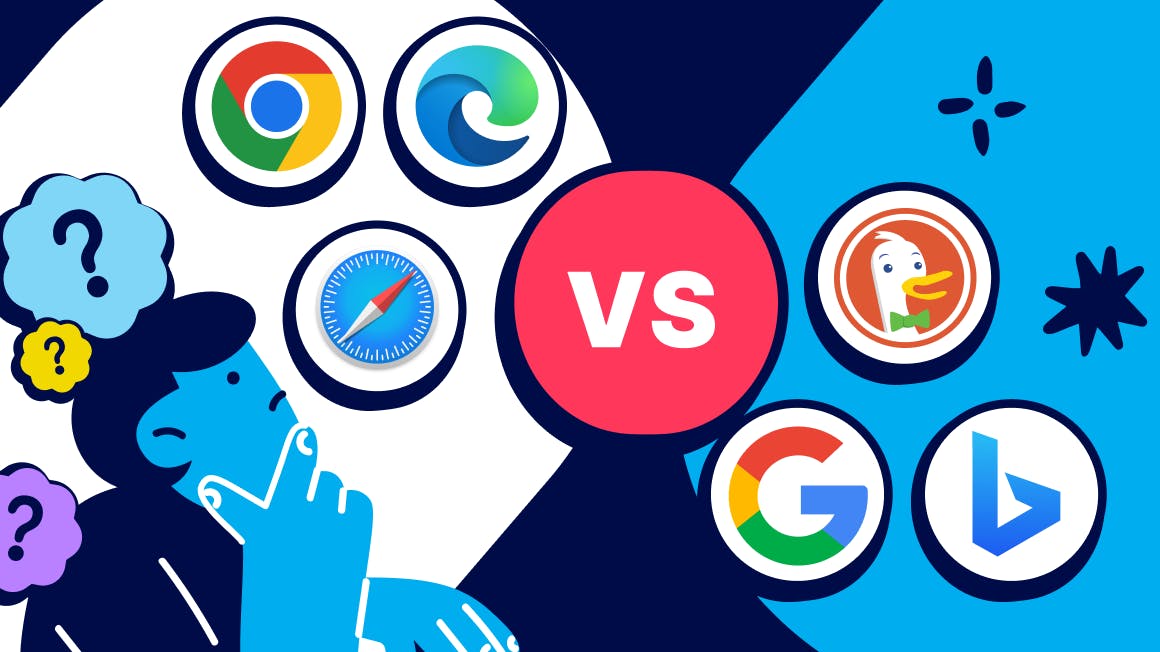Guide
Can You Be Tracked if You Use a VPN?
Key Points:
- VPNs enhance online privacy by encrypting traffic and masking IP addresses but cannot prevent all tracking methods like cookies, malware, or digital fingerprinting.
- Techniques such as DNS leaks, IP leaks, and logging into personal accounts can expose user activity even when using a VPN.
- Combining VPNs with tools like Ghostery helps block trackers and intrusive ads, offering a more comprehensive privacy solution.

Virtual Private Networks (VPNs) have become the Swiss Army knife of digital privacy tools, promising to cloak your online activity and shield you from prying eyes.
At their core, VPNs encrypt your internet traffic and reroute it through remote servers, masking your real IP address and making it harder for advertisers, hackers, or governments to monitor your browsing habits.
But while they’re a critical first line of defense, VPNs aren’t invisibility cloaks. They have limitations that many users overlook.
Understanding VPNs and Online Privacy
VPNs excel at hiding your location and encrypting data between your device and their servers. This makes it difficult for your internet service provider (ISP) to log your activity or for hackers on public Wi-Fi to intercept sensitive information like passwords.
However, they don’t erase your digital footprint entirely. Your social media interactions, search history, or app usage, can still leave traces that third parties exploit.
Even with a VPN active, your anonymity hinges on factors like the provider’s logging policies, the strength of encryption, and whether you’ve plugged other privacy leaks.
How VPNs Work
A VPN is like a secret tunnel for your internet. When you use it, your online activity gets scrambled into a code that no one else can read, keeping it safe from hackers or anyone trying to snoop.
A reliable VPN blocks VPN tracking attempts by routing your traffic through secure servers, making it appear as if you’re browsing from a different location.
This makes it look like you’re browsing from the server’s location, not your actual one, which helps keep your identity and location private.
VPNs also hide your location by making it look like you’re browsing from somewhere else. You can choose to send all your internet traffic through this tunnel (called full tunneling) or just some of it (called split tunneling).
Even with a VPN, some wonder, "Can an IP address be traced?" The short answer: only the VPN server’s IP is visible, not your real one, as long as the encryption remains unbroken.
In full tunneling, all your internet traffic goes through the VPN, while split tunneling allows you to choose which apps or websites use the VPN and which connect directly to the internet.
The VPN verifies that every server meets strict security standards (like using AES-256 encryption or TLS certification) before allowing a connection. If a server fails these checks, the VPN blocks your device from connecting to the server.
Kill Switch
Some VPNs also include a "kill switch". If the VPN disconnects, the kill switch blocks all internet traffic until the secure tunnel reconnects.
Potentially annoying? Yes. But it's appropriate for a higher threat model.
Look for this feature to hide your web traffic from the eyes of hackers or ISPs.
Important Note
Keep in mind that when you use a VPN, you’re shifting trust from the ISP to the VPN provider. This means your ISP can’t see your online activity, but the VPN provider can.
While most reputable VPNs prioritize privacy and don’t log your data, it’s important to choose a trustworthy provider.
Always read their privacy policy to understand how they handle your information.
Can You Be Tracked Using a VPN?
VPN tracking remains possible through methods like digital fingerprinting, which identifies devices based on browser settings.
Malware
Imagine installing a top-tier VPN only to have spyware lurking on your device.
Malware doesn’t care about your encrypted connection. It logs keystrokes, screenshots, or browsing activity directly from your hardware.
For example, a keylogger could capture your banking credentials before the VPN even encrypts the data.
Regular antivirus scans and avoiding suspicious downloads are non-negotiable, even if you’re using a VPN.
IP Address
VPNs hide your real IP address by assigning you a temporary one from their server network. But this protection isn't foolproof.
if your VPN connection drops unexpectedly (a common issue with unstable networks), your true IP can leak for seconds or minutes. This is known as IP leaks.
IP leaks during unstable connections temporarily expose your real location.
Reputable VPNs include a kill switch to block internet access entirely during disconnections, but not all apps offer this feature. Always test your VPN for leaks using tools like DNSLeakTest.
Cookies
Even with a VPN, browser cookies let websites track your activity across sessions.
Cookies are small data files that are stored on your device to remember your preferences and login details, but they can also be used to track your browsing habits across websites.
For example, logging into Amazon with a VPN ties your shopping to your account.
Clearing cookies regularly or using private browsing modes helps, but determined advertisers can still stitch together your behavior using supercookies or fingerprinting.
DNS Leak
When you type a website name, your device converts it to an IP address via a Domain Name System (DNS) server.
A DNS leak occurs when your device sends DNS requests outside the encrypted VPN tunnel. If your VPN fails to route DNS requests through its own servers, your ISP or third parties can see which sites you’re visiting.
Always choose VPNs with DNS leak protection and avoid using custom DNS addresses unless you’re certain they’re private.
Can ISP track VPN traffic? They can detect VPN use but not decrypt activity, unless DNS requests leak outside the tunnel.
Digital Fingerprinting
If you’re asking, “Can an IP address be traced?”, the answer is yes. Without a VPN, websites and advertisers can link your activity directly to your device.
Web trackers can still exploit browser cookies or device fingerprints to monitor your online behavior, even if your IP address is masked.
Fingerprinting is a sophisticated tracking method that identifies users based on unique configurations of their browser, device, and operating system. Unfortunately, VPNs do little to prevent fingerprinting, as this method doesn’t rely on your IP address.
VPNs don’t mask these details, which is why pairing them with privacy tools like Ghostery is essential to block trackers and randomize identifiable data.
You can also use the Tor browser to make you look the same as all other users of that browser.
Logging into Your Accounts
Signing into Facebook, Google, or Netflix while using a VPN instantly links your activity to your real identity. These platforms track your behavior across devices and services, rendering your VPN’s IP mask irrelevant.
For true anonymity, avoid logging into personal accounts while using a VPN. You can also create separate “burner” profiles for sensitive activities.
So, can you be tracked using a VPN? Absolutely. Wi-Fi administrators often detect VPN usage patterns, even if they can’t decrypt data. Only metadata (e.g., connection times), not specific websites visited, thanks to encryption.
Can Someone See You're Using a VPN?
Worried about “Can ISP track VPN?” While your ISP can detect VPN usage, it cannot monitor your browsing history or data thanks to encryption protocols like AES-256.
VPN tracking by advertisers and ISPs becomes nearly impossible when you use a VPN. Your encrypted connection hides your browsing history and real IP address.
But can you be tracked with a VPN? The answer is still complex.
Network Administrators and ISPs
While a VPN encrypts your traffic and hides specific sites or data, it doesn’t make you invisible. ISPs, network administrators, and public Wi-Fi operators can detect VPN usage through metadata. This includes your browsing patterns, connection times, and encrypted data flows to single servers.
VPN traffic typically appears as encrypted data traveling to a single server, which differs from standard internet traffic. While this doesn’t reveal your activity, it does indicate that you’re using a VPN.
Although they can’t decrypt your activity, DNS leaks or sudden disconnections can expose your real IP.
To counter these risks, enable a kill switch, pair your VPN with anti-fingerprinting tools, and regularly clear browser cookies to minimize tracking risks.
Websites and Online Services
Some websites and services actively block VPN users. This is often done by blacklisting IP addresses associated with VPN servers.
Streaming platforms like Netflix and Hulu may restrict access to prevent users from bypassing regional content restrictions.
If you’re suddenly blocked from accessing a site, your VPN’s IP might be flagged. Some services also use deep packet inspection (DPI) to identify VPN protocols, though premium providers counter this with obfuscation techniques that disguise traffic as regular HTTPS.
Streaming Services
Streaming services like Netflix, Hulu, and Disney+ often block VPNs because of licensing agreements. These agreements restrict where content can be shown, and VPNs make it appear as though you're accessing the service from a different country.
To enforce these restrictions, streaming platforms use techniques like IP blacklisting, where they block known VPN server IP addresses. They may also use advanced detection methods to identify unusual traffic patterns associated with VPNs.
These VPNs frequently update their server IPs to avoid detection and offer optimized servers for specific platforms. If a VPN server is blocked, switching to a different server in the same region often resolves the issue.
Some VPNs also provide features like smart DNS, which only reroutes your DNS requests to bypass restrictions without encrypting all your traffic. However, it's worth noting that bypassing geo-restrictions may violate the terms of service of some streaming platforms.
Public Wi-Fi Networks
Hotel or café Wi-Fi networks can also detect VPN usage. Administrators can monitor traffic on their network and identify encrypted VPN connections.
IPS web tracking relies on monitoring your IP address, but a VPN masks this identifier, making it harder for third parties to trace your online activity.
While this doesn’t compromise your privacy, it’s a reminder to always use a VPN on public Wi-Fi to protect against potential threats like man-in-the-middle attacks.
Why VPNs Alone Are Often Not Enough
Intrusive Ads and Trackers
VPNs encrypt your traffic but don’t block ads or stop trackers from profiling your behavior. A single Facebook “Like” button embedded on a news site can report your activity back to Meta, even if you’re using a VPN.
Over time, these trackers build detailed profiles tied to your interests, location, and habits.
To address this, pairing a VPN with an ad blocker or tracker blocker is crucial. Some VPN providers are starting to provide this service inside their VPN.
Strengthening Privacy with Ghostery
Tracker & Ad Blocker Ghostery fills gaps left by VPNs by blocking trackers, cookies, and invasive ads before they load.
Pairing a VPN with Ghostery creates a layered defense: the VPN hides your IP and encrypts data, while Ghostery stops third-party scripts from harvesting behavioral data.
This combo not only boosts privacy but also speeds up page loads by eliminating resource-heavy trackers.
Bottom Line
VPNs are powerful tools for safeguarding privacy, but they’re not magic. Risks like malware, fingerprinting, and account logins can pierce the veil of anonymity, and savvy adversaries can often detect VPN usage.
Treat your VPN as one piece of a larger privacy toolkit. Ad blockers, anti-fingerprinting browsers, and disciplined account hygiene to create a fortress around your digital life.
In the cat-and-mouse game of online tracking, privacy means staying vigilant and never relying on a single solution.
Get in touch with our team if you have any questions.


